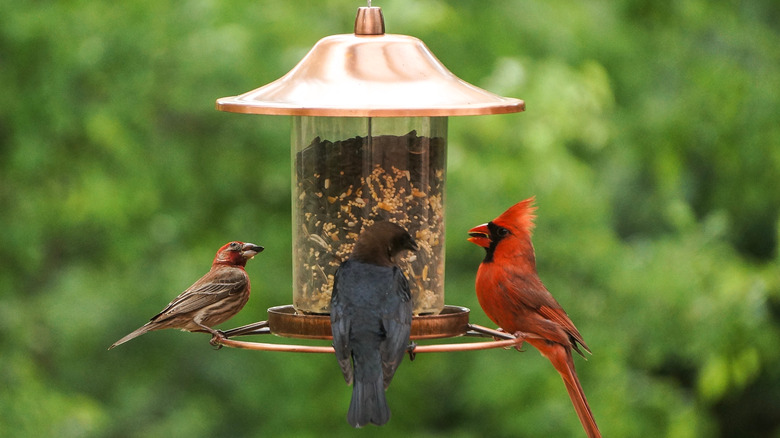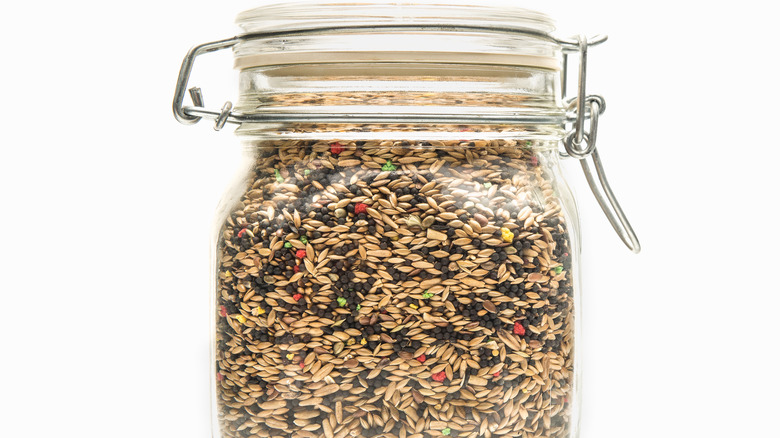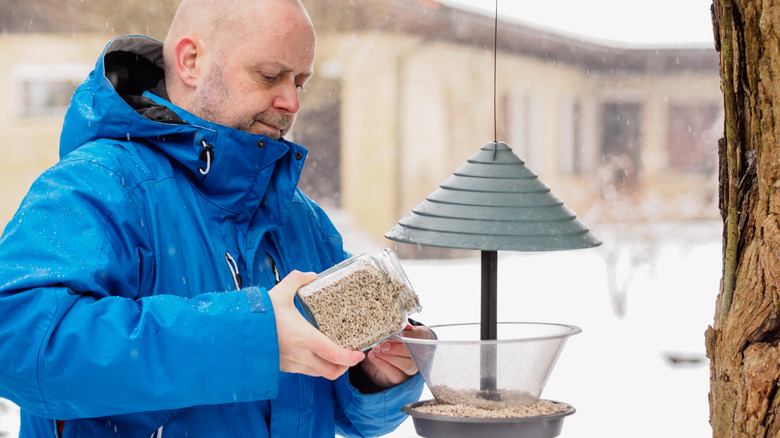How To Store Bird Seed To Keep It Fresh
Whether you are trying to attract cardinals, blue jays, or the unmistakable yellow-breasted western meadowlarks to your yard, chances are they won't be regular visitors if your feeder is filled with rotten bird seed. While birds aren't foodies, their stomachs are also not impervious. Consuming old food can make birds sick, and in some cases, hasten death. To avoid harming the feathered friends who frequent your outdoor bird diner, it's critical to keep food fresh by properly storing it in ways that account for weather and unwanted guests. You can accomplish this by selecting durable, airtight storage containers and placing them in a secure area.
In the long run, keeping bird seed fresh is a win-win situation for you and your favorite backyard visitors. After all, whether you add DIY bird seed or commercial brands to your feeder, refilling can take a toll on your household budget. For some homeowners, this incentivizes buying bird seed in bulk. However, if you are investing in a 40-pound bag of bird seed, you don't want it to go bad before you feed your flock. Fortunately, you don't have to be a backyard detective to recognize rotten bird seed. Simply check your feeder for damp clumps of seed, mold, insects, split or sprouting seeds, or a foul smell. If you detect any of these signs, empty the feeder, scrub it with hot soapy water, and refill with fresh food.
Picking the perfect bird seed storage container
When properly stored, bird seed can maintain its freshness for 6 to 12 months, and in some cases, even longer. This is due to the feed's ingredients — most standard mixes consist of sunflower seeds, cracked corn, and millet. While hardy, this feed is not invulnerable to the elements, which is why it's critical to keep extra bird food stored in airtight containers to preserve freshness. Whether you choose one large bucket or several smaller food containers, be sure they include lids that seal tightly in order to keep moisture, insects, and rodents out.
Bird seed storage containers should also be made of durable materials, such as plastic or metal. If selecting plastic, stick with thick, sturdy types especially if you are storing the containers directly on the ground, as hungry rodents have the ability to gnaw through thinner plastic. Storing bulk bird seed in smaller plastic food containers is fine provided you stash them in cupboards high enough off the ground to deter rodent invasions.
Likewise, metal offers robust protection from inclement weather and pests, though it's vital to choose a high-quality, galvanized metal that won't warp over time. Deformed metal lids are an open invitation to moisture and subsequent mold growth, not to mention insects and critters. Another option is glass. Repurposing airtight glass jars to store bird seed is an eco-friendly alternative; however, if you choose this method, take extra caution, as shattering can cause injuries.
Where to store extra bird seed
Selecting the perfect container is just half the battle when trying to extend the lifespan of bulk bird seed. The other factor to consider is where to place the container to protect it from the elements and pesky varmints. Indoor storage is optimal. Places like kitchens or basements allow extra bird seed to avoid direct sunlight, inclement weather, and extreme temperatures, all of which can accelerate spoilage. If a non-climate-controlled garage is your only indoor option, place bird seed storage containers in a cool, isolated corner away from doors and windows.
Many birders prefer storing bulk bird seed outdoors for convenience. While having extra feed in close proximity to bird feeders is a plus, there are some considerations to assess before making a patio, porch, or deck your permanent storage area. For starters, find a shady spot. Whether it's an eave or a tree, reducing the internal temperature of your storage container will prevent the feed from becoming a hotbed for humidity and mold. In addition, if you plan to keep your bird seed storage containers outside, extra protection is needed to ward off unwanted invaders, including squirrels, raccoons, and bears. Even if you are using an airtight container with a solid lid, consider adding extra weight on top, such as bricks or bags of mulch. Doing so will not only make it harder for wildlife to penetrate, but it will also help the storage container from being toppled over in high winds.


